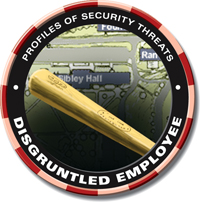Even before the Oklahoma City bombing on April 19, 1995, and the September 11, 2001 terrorist attack on the World Trade Center, many farmers had concerns about biosecurity and agroterrorism. Since 9/11, agroterrorism has garnered more national attention. Eighty percent of the farmers who responded to a 2002 Internet survey indicated that they expect some form of agroterrorism to occur in the United States.
Security is becoming an important issue for farmers. Even though the risk of an attack on your farm is minimal, you should at least consider your vulnerability to criminal acts such as the following:
- Theft of anhydrous ammonia for methamphetamine production
- Theft of farm equipment or chemicals
- Arson, poisoning of your well, or the deliberate opening of a valve on a chemical tank
- Criminal mischief involving unsecured equipment and machinery
- Destruction of confined animals, property, or products
- Destruction of bioengineered plants
- Intentional introduction or release of a contagious animal or plant disease
- General vandalism
These multiple threats are real and must be addressed by all farmers. If an incident occurs on your property, do not tamper with potential evidence such as footprints and dead animals or plants. When reporting the situation, ask what you should do while you wait for responders.
Consider what would happen if any of the following types of intruders were to gain unlawful access to your property.

The Mischief-Maker

Many farmers have had crops, animals, or other property damaged for no apparent reason. Events that cause damage to livestock, equipment, fences, gates, mailboxes, and/or buildings often defy common sense. Limited access, no-trespassing signs, strategic lighting, stepped up patrols, neighborhood watches, and careful placement of equipment left in fields all help deter vandals and mischief-makers.
The Trespasser
The jogger, the artifact collector, the mushroom hunter, the dog walker, the snowmobiler, and even your next-door neighbor may represent a risk to your farm. How?

For starters, they may trample your crops or damage fences; they may dump contaminated trash; they may be at risk from hunters to whom you have given permission to hunt. Would you be held liable in a court of law? Perhaps.
Depending on the time of year and on field activities, the risk to your crops and other assets-including your wallet-may increase or decrease. In Indiana and some other states, a person cannot be arrested for trespassing unless he or she has been forewarned to stay away; therefore it is important to post "No Trespassing" signs. Developing a relationship with neighbors is important if access is to be restricted during busy planting, spraying, or harvesting seasons.
The Thief

The most common crimes on the farm are fuel theft and the heist of high-dollar items such as tools, computers, safes, fertilizers, tractors, backhoes, and pesticides in packages that can be easily picked up and loaded onto or into a vehicle. It is important to identify, document, and secure valuable items that might tempt intruders; and it is particularly advantageous to conduct periodic vulnerability assessments.
Keep tabs on your inventory. Maintaining accurate records will alert you to deficits that might otherwise go undetected. Conduct an in-depth audit to see what needs to be insured and secured; record all vehicle identification numbers and license plate numbers. A sound security program includes access control measures, property accountability, insurance coverage, and employee awareness.
Videos, scanned documents, and photographs stored off-site can be extremely important in assessing the value of lost or damaged goods.
The Narcotics Entrepreneur

Drug-related incidents such as theft of anhydrous ammonia from isolated nurse tanks have increased dramatically; and while your actual monetary loss may be minimal, damage to the tanks and the consequences of an ammonia release can be significant.
Consult your local anhydrous ammonia supplier and devise a plan to minimize the time that you actually have anhydrous tanks on your farm. Always be on the lookout for signs of tampering, and call the sheriff's office to report anything suspicious. Getting law enforcement involved is critical if suspects are to be apprehended.

Drug makers often leave a trail of crude collection devices, lithium batteries, mason jars, chemicals, and other drug paraphernalia. This type of litter scattered across the ground or in barns and buildings may pose a real threat to human safety, and cleanup can be costly. If it happens to you, do not attempt to clean up the mess yourself. Ask the state police for assistance; they have specially trained technicians to do the job, and there may be state or federal grants available to pay for remediation.
The Disgruntled Employee
 A disgruntled former employee can be a serious threat to your farm security as well as the safety and well-being of others on the premises. His familiarity with the farm and its security strengths and weaknesses make it easy for him to access critical areas. Current employees might allow him to enter, not knowing that he is holding a grudge, or he may have keys!
A disgruntled former employee can be a serious threat to your farm security as well as the safety and well-being of others on the premises. His familiarity with the farm and its security strengths and weaknesses make it easy for him to access critical areas. Current employees might allow him to enter, not knowing that he is holding a grudge, or he may have keys!
Any disgruntled employee should be considered a potential threat for workplace violence. Ask your insurance agent about an endorsement called "Employee Dishonesty Coverage" that can be purchased to cover losses caused by current or former employees.
If you are concerned about a former employee, reevaluate security and consider modifications such as changing locks and routine inspection times. If you believe that the individual might attempt to sabotage equipment, remove key parts during downtime to render it inoperable, just in case.
Anytime an employee voices a complaint, meet with him privately and listen closely and open-mindedly to his concerns. Even if you can't change the situation, listening goes a long way toward deterring retaliatory actions by a disgruntled employee.
Hiring a New Employee
In order to protect your assets and ensure a safe, secure work environment, you need to know more about a new hire than what he or she puts on an employment application. Complete a pre-employment background investigation on each applicant whom you consider hiring; if you have two individuals who appear equal in skills and experience, this may be the deciding factor. The extent of the background investigation should hinge on the degree of access the prospective employee will have to your assets. Check criminal records back seven years for all counties of employment and residence. Trace his social security number to verify the number and places of residence. Check driver's license records if the employee will be driving your vehicles; and check his or her immigration status as determined by form I-9.
If the employee will have access to money, computers, records, etc., a more detailed background check is necessary. In addition to taking the steps already mentioned, you should investigate credit records, civil records, and employment references; and you should verify the person's education. All background investigations must be in compliance with the Federal Fair Credit Reporting Act as amended by the Consumer Credit Reporting Reform Act of 1996. Outside firms can be hired to conduct these investigations in compliance with the law.
The Computer Hacker

It seems that each week a new computer virus is crashing computers across the country, destroying valuable documents. Computer terrorists can destroy years' worth of your data in a matter of minutes: financial and crop production records, lease contracts, and government program information. Cyber-terrorists can make it difficult for you to plan for the future by destroying your records of the past. But modern technology provides simple, inexpensive ways to back up your records as a safeguard against such a loss.
Work with your computer service provider to be sure that your computer has adequate protection, and back it up at least once a week: no exceptions. File hard copies of critical information and important records outside your home or office. Designate a safe place at a remote location and maintain it diligently so that is always up-to-date. Together, these two precautions will protect your computer data as well as it can be protected, and the effort it takes to do these things is minimal compared to the problems you might encounter if a computer hacker were to strike.
The Homegrown Extremist

Extremists are not activists who protest by writing letters to the editor, push for legislative reforms, or assemble peacefully to protest government policies. Instead of working through appropriate channels to effect change, extremists resort to criminal acts such as trespassing, burning buildings, and releasing animals from captivity; they may destroy genetically modified plants or drive steel spikes into trees scheduled for harvest. People can be severely injured or killed as a result of extremists' actions, even if the perpetrators don't intend to inflict bodily harm.
Extremists may plan criminal acts in the name of a cause, but they normally lack the skill to deal with well-planned security systems. They look for soft targets such as farms and facilities where there is little or no security, where fields or buildings are essentially out-of-sight, or where security measures are lax. Even where security exists, extremists sometimes will attack if they deem their intent worth the risk of getting caught. They tend to work in specific geographical areas and with specific types of production (dairy, poultry, swine, etc.); genetically modified crops may also be targeted. Review your operation with an informed county sheriff or state police officer to find out if your farm is at risk.
Try to make extremists' risk unacceptable. Defend against their attacks with security measures that reflect your specific situation. Place your valuable or vulnerable property in locations where it is unlikely to be targeted or affected. Sometimes you can't protect everything, so check with your insurance representative to determine exactly what your insurance policy covers. Are you insured for damage caused by protestors? If you implement extra safety and security measures, ask your insurance agent for a premium reduction based on your efforts to protect yourself against loss-and your insurance company against having to pay a claim. Find out if your state or industry keeps Global Positioning System and Geographic Information System data as public records or on an Internet site that reveals the physical location of your farm; if so, consider what to do.
The Terrorist
 The common criminal is motivated by monetary gain, but often he is deterred by the risk of getting caught. The terrorist, on the other hand, has political or idealistic goals; his focus is on accomplishing his mission, even if there is a good chance that he will get caught. His actions are planned and coordinated; often they are carried out by skilled, trained-and perhaps armed-adversaries. Security measures that normally deter vandals, petty thieves, and fringe extremists likely will not deter terrorists, so plan your security measures accordingly. Acknowledge that the threat is real. Protect your critical assets.
The common criminal is motivated by monetary gain, but often he is deterred by the risk of getting caught. The terrorist, on the other hand, has political or idealistic goals; his focus is on accomplishing his mission, even if there is a good chance that he will get caught. His actions are planned and coordinated; often they are carried out by skilled, trained-and perhaps armed-adversaries. Security measures that normally deter vandals, petty thieves, and fringe extremists likely will not deter terrorists, so plan your security measures accordingly. Acknowledge that the threat is real. Protect your critical assets.
What is the terrorist threat? An Extension Disaster Education Network (EDEN) survey asked farmers to identify specific threats posed by terrorists. Responses to the questions below indicate current perceptions; the full text of the survey is available on the EDEN website.
- (Q) How likely do you think it is that an agricultural, food, or water bioterrorist attack will take place somewhere in the USA?
[ Likely: 86%; Unlikely: 14% ] - (Q) Do you feel that you are properly prepared for agroterrorism or some other security-based event against your operation?
[ Yes, 14%; No, 51%; Don't Know, 35% ] - (Q) If you feel your operation is at risk to terrorist activity, which aspects do you think are at greatest risk? Check all that apply.
[ Contamination of water, 45% ]
[ Loss of livestock or other animal production, 44% ]
[ Loss of income due to impact on commodity markets, 41% ]
[ Contamination of animal or crop production, 31% ]
[ Contamination of feed, 29% ]
Terrorists are bent on doing extensive damage to agricultural production and processing facilities. Their goals are to undermine public confidence in the safety and reliability of the nation's food supply, to wreak large-scale economic havoc, and to generate political instability. Government officials and university scientists are concerned that terrorists could introduce virulent forms of animal and plant diseases or chemical agents into American agriculture. Threats to the local or municipal drinking water supply and power distribution systems are of concern as well. While the direct physical risk to individual farm operations is low, the impact of an attack on a large region or the entire country could be devastating. Even false rumors have caused a significant drop in market prices of impacted commodities.
Terrorist groups may practice prior to actually committing the act; that is, they might conduct dry runs to make sure that they have everything in place before they actually strike. You can deter their efforts by using good judgment in conducting your farm operation, by being aware of visitors to your farm, and by scouting for unusual crop or animal disorders. Vigilance is imperative. The USDA website contains information on and images of symptoms of exotic plant and animal diseases.
It is important to report outbreaks of suspicious diseases to authorities-promptly-to limit potential terrorist activities. In an EDEN survey, 80 percent of farmers polled said they would contact their Cooperative Extension Office if they suspected an unusual crop disease. About 70 percent reported that they would contact a veterinarian if they suspected an unusual animal disease. These are important steps toward getting a proper diagnosis and taking appropriate action to prevent the spread of an organism.
These scenarios are not meant to imply that America's farms are under attack; and neighbors certainly should not fear living next to your agricultural operation. Rural areas are still safe places to raise a family and enjoy a wonderful way of life. However, in today's changed world you, the farmer, must implement security measures to protect your farm, your family, and your neighbors. You must do your part through preparation and planning to thwart potential attacks.